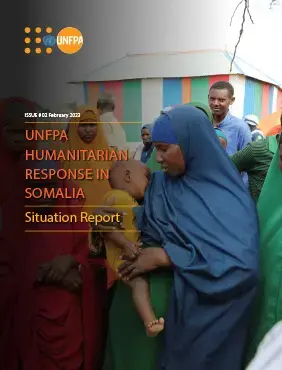The humanitarian crisis in Somalia remains dire. Severe drought, famine, disease, and violence have impacted millions, leading to widespread displacement. In 2022 alone, drought-related displacement increased by over five times, with more than 1.4 million people displaced since January 2021. Recently, humanitarian partners and the Federal Government of Somalia unveiled the 2023 Humanitarian Response Plan (HRP) on 8 February 2023. The Somalia 2023 Humanitarian Needs Overview (HNO) analysis indicates that nearly half of the estimated population, or around 8.25 million individuals, require life-saving humanitarian assistance and protection.
The armed conflict between Somaliland and the Las’anod community has caused severe damage to the Las’anod General Hospital, including the maternal health ward and equipment, due to heavy artillery shelling. As a result, two maternal health facilities and two GBV facilities have been forced to close, and many of the supported facilities are now without essential medical equipment and supplies, putting vulnerable pregnant women at risk. The region was already impacted by successive droughts and failed rainy seasons, that have affected the population’s food security. According to the IPC (Integrated Food Security Phase Classification) results in December 2022, the population of Las’anod is facing a dire situation, with 35% to 50% of the population in IPC3 or higher, which is the crisis and emergency phase of acute food insecurity. Displaced individuals have relocated to areas with a high percentage of the population in IPC3+ such as the rural part of Las Anod, south of Sool, Buuhoodle in Togdheer, or Garowe city in Puntland, which already have significant IDP settlements. These areas are expected to be at risk of IPC5 Catastrophe by April-June 2023.
In response to the Las’anod crisis, UNFPA Somalia country office (CO) is providing urgent medical assistance through its partners, who are working around the clock to ensure that conflict-affected individuals have access to critical services. The CO supports 11 Emergency Obstetric and Newborn Care (EmONC) facilities, with eight located in the Sool region (including Falayeryaal, Awrbogays, Saah-Dheer, Las’anod, Xalin, Las’anod, and Hudun) and three in Garowe. All of these facilities operate around the clock to serve women, girls, and children affected by the conflict.
UNFPA partners are further strengthening their capacity to support the delivery of life-saving services to address sexual and reproductive health (SRH) needs and gender-based violence (GBV) interventions and respond to increasing needs. Health facilities and mobile clinics provide services to support maternal and newborn health, birth-spacing options, and clinical management of rape (CMR). Mental health and psychosocial support (MHPSS) services are offered to survivors of GBV in safe spaces for women, girls, and young people, as well as in one-stop centers.
Somalia Situation Report - February 2023

Publisher
UNFPA Somalia
Number of pages
8
Author
UNFPA Somalia
Situation Report
Somalia Situation Report - February 2023
Publication date
23 March 2023

